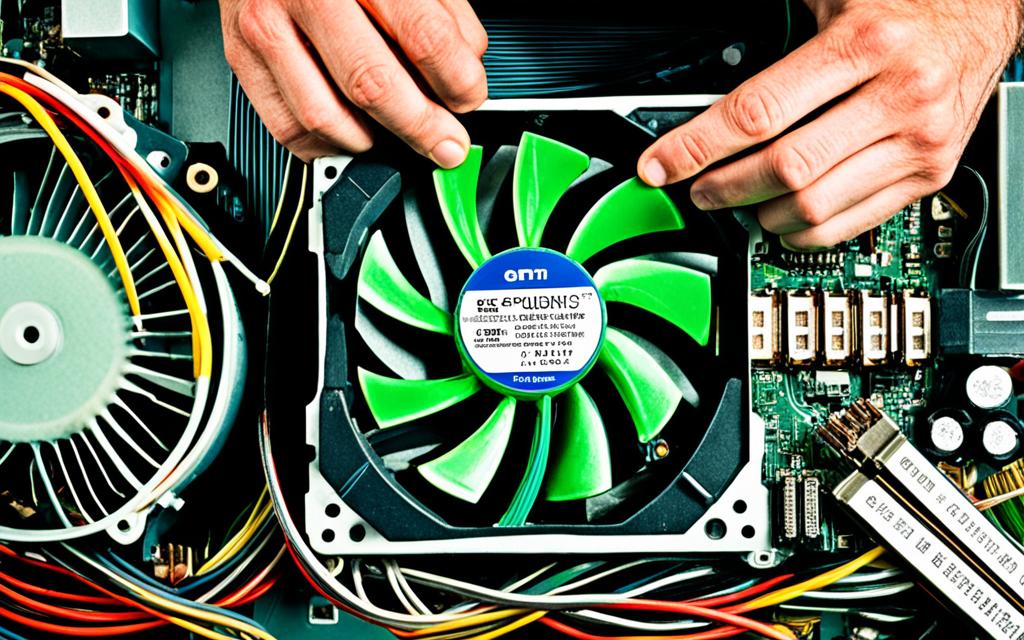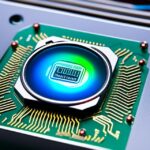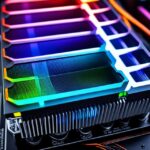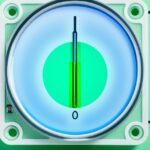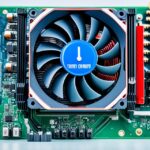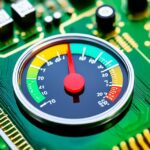Table of Contents
It’s frustrating and worrying when a CPU fan turns on and off by itself. This fan is key in keeping the processor cool. If it doesn’t work right, the computer might overheat. Often, a fan acts up because of obstacles, broken connections, or software clashes. This article will show you how to fix these problems. That way, your computer stays cool and works well. Sometimes a fan might seem like it’s not working because of wrong temperature sensor readings1. Knowing about these problems is crucial for anyone wanting to keep their computer in top shape.
Key Takeaways
- Intermittent CPU fan behaviour can signal deeper issues within the system.
- Dust accumulation is a leading cause of CPU fan problems, affecting performance.
- Faulty connections or components can disrupt cooling functionality.
- BIOS settings may need adjustment to ensure proper fan operation.
- Regular maintenance can mitigate many common CPU fan issues.
- A professional assessment can be beneficial, especially for complex problems.
Introduction to CPU Fan Functionality
The CPU fan is vital for keeping the computer cool and running smoothly. It does this by moving air to remove heat from processing, which stops the computer from getting too hot.
Understanding the Role of the CPU Fan
As our use of technology increases, so does the need for better cooling methods in our gadgets. Today, a 120mm size is common for PC fans, but 140mm fans are becoming more popular2. Fans are essential for moving heat out of devices, even though they may make noise and use more power3.
There are different fans for different needs, including 2-wire, 3-wire, and 4-wire fans. The 4-wire fans are great because they can adjust their speed accurately. They can run quietly at low speeds thanks to PWM signals that help keep noise down3.
Common Symptoms of CPU Fan Issues
If your CPU fan acts up, is noisy, or stops spinning, it’s time to check it. Keeping an eye on CPU temperatures is also important. They should stay between 40°C and 85°C, based on the CPU type4. High or fluctuating temperatures might mean there’s a problem with cooling.
Tools like CPU-Z, SpeedFan, or Open Hardware Monitor can help find any fan issues. Addressing these early can boost system performance and protect your computer’s important parts.
Why Does My CPU Fan Start and Stop?
The performance of your CPU fan is key to keeping your device cool. Knowing the causes of CPU fan issues helps in fixing its unpredictable behaviour. Important factors include electrical problems, dust build-up, and the power supply unit’s condition.
Electrical Connection Problems
Often, a CPU fan stops and starts because the power flow is not steady. This issue arises if the fan’s connection to the motherboard or controller is loose. On forums, many mention this problem, especially with the Gigabyte P43-ES3G motherboard, underlining the need for secure connections5.
Dust and Dirt Buildup
A dusty CPU fan can greatly hinder its effectiveness. When dust blocks the fan blades, the fan struggles to work properly. Regularly cleaning your fan is vital to prevent overheating and maintain airflow6.
Faulty Power Supply Unit
A reliable power supply is crucial for your fan to work well. If the power supply is weak, the fan may not work steadily. This issue can damage circuits and lead to shutdowns. Fixing power supply problems is often the solution6.
| Issue | Description | Solution |
|---|---|---|
| Electrical Connection | Loose or improper connections to the motherboard | Check and secure all connections |
| Dust Accumulation | Blocked airflow due to dust | Clean the fan and heatsink regularly |
| Power Supply Issues | Inconsistent power delivery affecting performance | Inspect and possibly replace the power supply |
Solving these problems will prevent other issues and make your CPU fan more reliable576.
Steps for Diagnosing CPU Fan Problems
When your fan acts up, taking a methodical approach is key. These steps will guide you through diagnosing CPU fan problems.
Checking the Fan’s Connection
Begin by checking the fan’s connection. Make sure the fan is properly connected to the motherboard. A loose connection often causes the fan to stop and start unexpectedly. If you’ve taken the fan out before, double-check it’s connected right to dodge any issues.
Inspecting the Motherboard and CPU for Damage
Give the motherboard a thorough look. Search for visible damage or burnt parts that show past electrical issues. Such damage can affect fan function, leading to overheating and the risk of hardware failure. Regularly clean off dust to fend off many of these issues.
Testing with a Different Power Supply
If the above steps didn’t help, try a different power supply. A weak power source can make the fan act weirdly. This step is often key in finding what’s wrong with the fan.
By following these steps carefully, you can tackle typical CPU fan issues. Remember, keeping your components clean and well-maintained helps keep them running smoothly86.
Potential Solutions to CPU Fan Issues
Dealing with CPU fan problems requires a systematic approach to regain proper function. Here are some smart fixes for common fan issues many face.
Cleaning the CPU Fan and Heatsink
Dust and dirt build-up can lead to CPU fan malfunctions, making the fan less effective. By cleaning the fan and heatsink regularly, you can keep your CPU cool. Users should detach the fan and gently clean it with compressed air or a soft brush9.
This kind of maintenance prevents the need for costly repairs later.
Replacing the Fan if Necessary
Should cleaning fail, it might be time to replace the CPU fan. Fans can wear out or break, causing overheating and system issues10. It’s important to choose a fan that fits your system to improve cooling.
Ensuring Proper BIOS Settings
The BIOS controls fan speeds and cooling efforts. Wrong settings might stop the fan at low CPU loads, causing irregular fan operation10. Update the BIOS often and check the settings to avoid cooling problems. This step is key in fixing CPU fan challenges and boosting your system’s reliability and performance11.
Conclusion
It’s key to understand CPU fan issues to keep the CPU running well and avoid downtime. Using a detailed CPU fan troubleshooting guide helps find and fix issues like dust blockage or a faulty motor12. It’s vital to regularly clean the fan and check its connections to prevent overheating and power problems13.
Also, keeping firmware and BIOS updated can improve fan efficiency and system stability. If the CPU gets too hot or problems keep happening, getting professional help can avoid more serious issues14. This proactive stance not only extends the system’s life but also gives users the skills to fix problems on their own, making for a better computing experience.
FAQ
What should I do if my CPU fan briefly spins and then stops?
First, make sure the electrical connections are secure on the motherboard. Check for dust or debris that could block the fan.
How can I tell if my CPU fan is malfunctioning?
Look out for irregular spinning, strange sounds, or if the fan won’t spin at all. Noticing these signs early can prevent your processor from overheating.
What causes a CPU fan to operate inconsistently?
Issues can arise from unstable electrical connections, airflow blockages from dust, or a faulty power supply. These problems can lead to inconsistent fan operation.
How can I diagnose my CPU fan issues?
Check the fan’s connection to the motherboard first. Then examine both the motherboard and CPU for damage. Try a different power supply to see if the fan works properly.
What maintenance steps should I take for my CPU fan?
Cleaning your CPU fan and heatsink regularly is crucial. It removes dust and ensures the fan cools efficiently, possibly fixing some issues.
When should I consider replacing my CPU fan?
Think about getting a new CPU fan if cleaning doesn’t help and you observe signs of failure. Indicators include reduced airflow or loud noises.
How can I ensure my CPU fan operates effectively?
To keep your CPU fan working well, adjust your BIOS settings for fan speed. Regular cleaning and replacing the fan when needed will also help maintain system stability.
Source Links
- https://softwareg.com.au/blogs/computer-hardware/pc-cpu-fan-starts-then-stops – PC CPU Fan Starts Then Stops
- https://www.titanrig.com/blog/post/water-cooling-components-fans – PC Case Fans – Function and Considerations | TITAN RIG Blog
- https://www.analog.com/en/resources/analog-dialogue/articles/how-to-control-fan-speed.html – Why and How to Control Fan Speed for Cooling Electronic Equipment
- https://ms.codes/en-gb/blogs/computer-hardware/pc-cpu-fan-starts-then-stops – PC CPU Fan Starts Then Stops
- https://www.techguy.org/threads/cpu-fan-turns-on-and-off-repeatedly.1186236/ – Solved – CPU fan turns on and off repeatedly
- https://www.lifewire.com/fix-cpu-fan-error-4687270 – How to Fix a CPU Fan Error
- https://rog-forum.asus.com/t5/rog-strix-series/cpu-fan-issue-starts-and-stops/td-p/283553 – CPU Fan issue?- starts and stops
- https://www.dell.com/support/kbdoc/en-us/000179087/how-to-troubleshoot-fan-issues – How to Troubleshoot Fan Issues
- https://www.linkedin.com/advice/3/what-common-causes-symptoms-cpu-fan-failure-skills-hardware-support – What are the common causes and symptoms of a cpu fan failure?
- https://softwareg.com.au/blogs/computer-hardware/cpu-fan-spins-and-stops – Cpu Fan Spins And Stops
- https://www.electronicshub.org/cpu-fan-error/ – CPU Fan Error – How To Fix?
- https://softwareg.com.au/blogs/computer-hardware/cpu-fan-stops-spinning-randomly – CPU Fan Stops Spinning Randomly
- https://www.linkedin.com/pulse/how-fix-cpu-fan-error-asus-motherboard-tarapada-roy-8g0tc – How to Fix CPU Fan Error in Asus Motherboard
- https://www.truenas.com/community/threads/computer-not-starting-after-stock-cpu-fan-replaced.89127/ – Computer Not Starting After Stock CPU Fan Replaced

